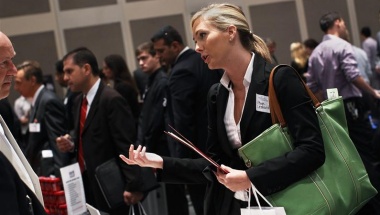
Washington, October 6: The US unemployment rate dropped to a near four-year low of 7.8 percent in September, a potential boost to President Barack Obama's re-election bid.
The Labor Department said on Friday the unemployment rate, a key focus in the race for the White House, dropped by 0.3 percentage point to its lowest point since January 2009 as employers added 114,000 workers to their payrolls.
The drop in the unemployment rate reflected an even bigger surge in new jobs captured by a survey of households and came even as Americans returned to the labor force to resume the hunt for work. The workforce had shrank in the prior two months.
Payrolls for July and August were revised to show 86,000 more jobs created than previous reported, mostly to reflect increases in government employment.
The jobless rate is now where it was when Obama took office in January 2009. Household employment increased 873,000, the most since June 1983, according to the household survey. The bulk of the gains were part-time jobs.
“There is something in these numbers for everyone. The rise in the participation rate shows somewhat of a real improvement in the labor market,” said Omer Esiner, chief market analyst at Commonwealth Foreign Exchange in Washington.
US stock index futures rose on the report, while prices for Treasury debt tumbled. The dollar rose versus the yen and the euro.
It was the second last report before the Nov. 6 election that pits Obama against Republican Mitt Romney.
A Reuters/Ipsos poll released on Thursday after Wednesday's first presidential debate showed Romney gained ground and is now viewed positively by 51 percent of voters. Obama's favorability rating remained unchanged at 56 percent.
Persistently poor labor market conditions led the Federal Reserve in September to announce a plan to buy $40 billion worth of mortgage-backed securities each month until it sees a sustained turnaround in employment.
The central bank, which also pledged to keep overnight lending rates near zero until at least mid-2015, hopes the purchases drive down long-term borrowing costs and spur the recovery.
The Fed's ultra-easy stance has started to free up credit, giving a lift to consumers, economists said. That, in turn, helped lift retail hiring in September.
Temporary help jobs, which are often seen as a harbinger for permanent hiring, fell 2,000 after being almost flat in August.
Manufacturing payrolls fell for a second straight month.
Construction employment rose 5,000, benefiting from the rise in home construction, as demand for housing rises against the backdrop of record low mortgage rates Government payrolls rose 10,000 after increasing 45,000 in August. Average hourly earnings rose 7 cents last month, which could support spending.






Comments
Add new comment